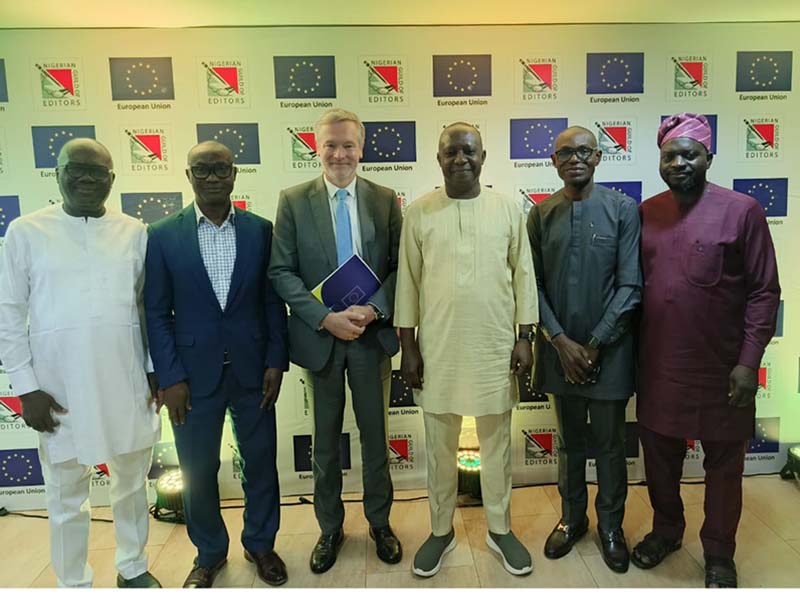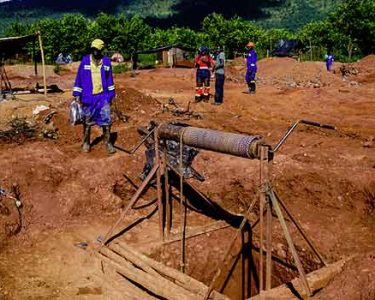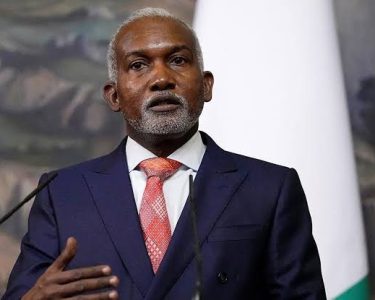Newsrooms to combat fake news
Nigerian editors to establish fact-check desks
Summary
- Nigerian editors, under the Nigerian Guild of Editors (NGE), have resolved to set up dedicated fact-check desks in newsrooms to combat fake news, misinformation, and disinformation
- The initiative follows a workshop in Lagos on Thursday, July 24, 2025, organised by the European Union (EU) in collaboration with the NGE, aiming to bolster journalism’s credibility and safeguard democratic processes, especially ahead of the 2027 general elections
- Approximately 50 editors from various media platforms attended the workshop, where resolutions were made to train newsroom managers, establish disinformation counter groups, and foster collaboration among media organisations
- The EU Ambassador to Nigeria, Gautier Mignot, highlighted that 85% of people globally are concerned about disinformation’s impact, with 38% of EU citizens viewing it as a threat to democracy, underscoring the urgency of such initiatives in Nigeria
Lagos, Nigeria – In a significant move to counter the escalating threat of fake news and misinformation, Nigerian editors, through the Nigerian Guild of Editors (NGE), have committed to establishing dedicated fact-check desks within newsrooms nationwide.
This resolution emerged from a one-day workshop held in Lagos on Thursday, July 24, 2025, a collaborative effort between the European Union (EU) and the NGE. The initiative seeks to enhance journalistic credibility, promote accurate reporting, and protect democratic integrity, particularly in the lead-up to the 2027 general elections.
The proliferation of social media and digital platforms has significantly amplified the spread of misinformation in Nigeria, often leading to severe consequences for public trust, social cohesion, democratic governance, and national security. The workshop, attended by around 50 editors from print, online, and broadcast media, was a direct response to the increasing recognition that fake news undermines professional journalism and poses a “danger to democracy and public trust,” as stated by Gautier Mignot, the EU Ambassador to Nigeria and ECOWAS.
The EU, with its global experience in combating disinformation through initiatives like the European Digital Media Observatory (EDMO) and the Rapid Alert System (RAS), partnered with the NGE to equip Nigerian editors with essential skills and tools. This collaboration builds on prior EU support in Nigeria, including assistance to Dubawa, a prominent fact-checking platform, and training for journalists.
A 2020 report by the Centre for Democracy and Development (CDD) underscored Nigeria’s unique challenges, highlighting how disinformation has exacerbated ethnic and religious tensions, with technology enabling the rapid dissemination of false information in diverse formats.
Key resolutions from the Lagos workshop include: the establishment of dedicated fact-check desks in newsrooms to verify news tips and ensure credible information; the encouragement of regular fact-checking training for newsroom managers and editors; the formation of NGE zonal disinformation counter groups to prepare for the 2027 general elections; and the emphasis on collaboration and cross-verification among media houses.
Additionally, media organisations were urged to ensure experienced journalists oversee online desks due to their vulnerability to rapid misinformation spread, and the NGE committed to using its platforms to raise public awareness about fake news.
The workshop featured presentations by notable media professionals such as Azu Isiekwene of Leadership Newspapers and Dr. David Ajikobi of Africa Check. Sessions covered principles of fact-checking, identifying misinformation and disinformation, and practical fact-checking tools.
EU Ambassador Mignot reiterated the EU’s global commitment to combating disinformation, noting that advancements in technology have made it easier to generate and disseminate deceptive content.
Eze Anaba, NGE President, described the workshop as “timely and critical,” emphasising that deliberate disinformation undermines public trust and threatens social cohesion, democratic governance, and national security.
The establishment of these fact-check desks is expected to significantly enhance media credibility and accuracy in reporting, particularly by ensuring only verified information is published. This initiative is also poised to strengthen democracy by combating disinformation ahead of the 2027 elections, thereby fostering informed decision-making and a more stable democratic process. Ultimately, it aims to empower the Nigerian public with greater media literacy.
Despite the positive momentum, challenges remain. Resource constraints, including financial and human capital, pose a significant hurdle for Nigerian media organisations facing economic pressures. The rapid evolution of digital tools, including artificial intelligence, also makes disinformation more sophisticated, necessitating continuous training and access to advanced fact-checking tools.
Furthermore, restoring public trust in media, which has been eroded by misinformation, will require consistent transparency and accountability just as the effective implementation of these initiatives across Nigeria’s diverse regions, including rural areas, will demand coordinated effort and resources.
This new move builds upon previous fact-checking efforts in Nigeria, notably during the 2023 general elections. The Nigeria Fact-checkers’ Coalition (NFC), which included organisations like CDD Fact-check and Dubawa, played a crucial role in debunking false claims by politicians. For example, FactCheckHub’s efforts led to corrections from presidential candidates after false claims were identified. Innovations like Dubawa.ai, an AI-powered fact-checking chatbot, and Dataphyte’s Nubia tool underscore the growing role of technology in this ongoing battle.
The resolution by Nigerian editors marks a proactive step against the pervasive issue of fake news and misinformation. Its success hinges on sustained commitment, adequate resources, and adaptability to the evolving digital landscape, with the 2027 elections serving as a critical deadline for ensuring accurate and trustworthy reporting.







